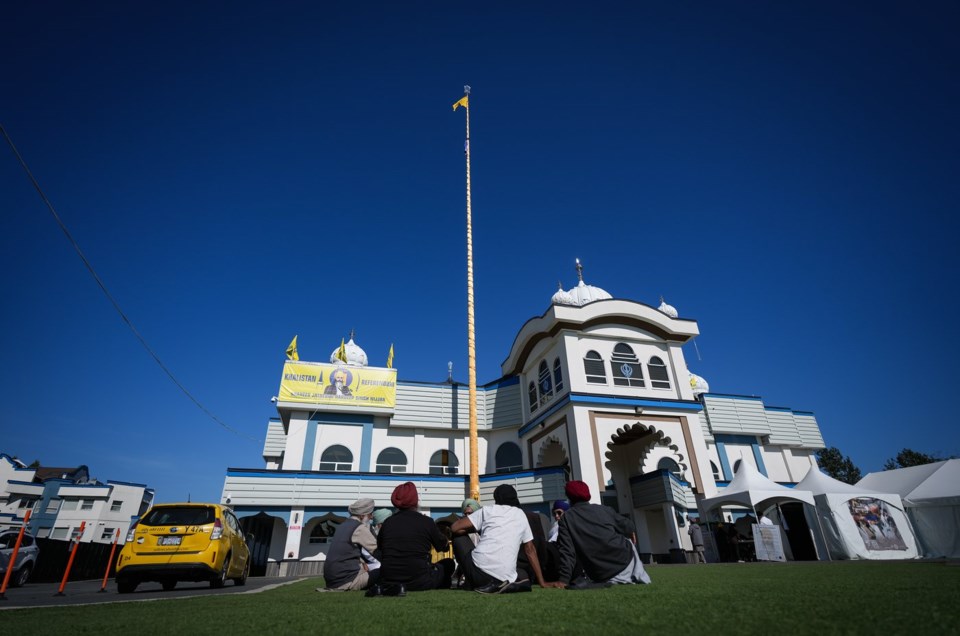SURREY, B.C. — Sikh activists marked the anniversary of the killing of British Columbia temple leader Hardeep Singh Nijjar by holding a mock murder trial for Indian Prime Minister Narendra Modi Tuesday outside the Indian consulate in downtown Vancouver.
On a block of Howe Street cordoned off by police, the mock trial included a jury made up of actors and a judge in a curly white wig, who invited the "prosecutor" to present evidence of Modi's involvement in the killing in Surrey, B.C., last year.
An effigy of Modi, dressed in prison stripes, was paraded down the street in a makeshift cage before the mock trial began on Tuesday.
Jatinder Singh, a lawyer and director with activist group Sikhs for Justice, told the crowd that Nijjar was "executed," and quoted Martin Luther King.
"Injustice anywhere is a threat to justice everywhere," Singh said. "This crime was against a Canadian citizen and it was perpetrated on Canadian soil, however the conspiracy and ultimate responsibility was hatched thousands and thousands of kilometres away in India."
Nijjar, a key organizer for an overseas referendum on an independent Sikh state in India, was gunned down in the parking lot of the Surrey temple where he was president on June 18 last year.
Prime Minister Justin Trudeau later told Parliament that credible intelligence linked Nijjar's death to India's government, straining relations between Canada and India.
Four Indian nationals — Karan Brar, Amandeep Singh, Kamalpreet Singh and Karanpreet Singh — are accused of murder and conspiracy in Nijjar's killing.
Singh said they convened a "peoples' court" to demonstrate that Modi was responsible for Nijjar's killing, calling the court a "voice for the voiceless."
Several police officers guarded the consulate building as the loud spectacle unfolded, with Singh presenting news reports and a CBC documentary as "evidence."
He said in an interview that the mock trial was meant to send a message to the Indian government that the "issue is not going to go away," and also bring awareness to the broader Canadian public of the risks of advocating for a Sikh homeland, known as Khalistan.
"When you ask for independence and sovereignty there's always a risk," he said. "We must continue on because if we don't, then our children will also face the same danger, and their children, and their children. It is our duty to stop this danger to our people."
Ranjit Singh, who attended the mock trial, said he had been in Canada for 37 years and joined the movement for Khalistan in 1978.
He said he came to send a message to the Indian government that attacking an innocent Canadian citizen would not deter him from advocating for a Sikh homeland.
"We have to come here because how can we save my brothers and sisters who are living in India? They are not sparing us here," he said.
Sikh activist and lawyer Gurpatwant Singh Pannun said the past year has vindicated claims that India targeted separatists overseas.
The New York-based activist who himself was targeted by India according to U.S. authorities, said Nijjar's murder was "not the kind of publicity" the Sikh independence movement was seeking.
Pannun said Nijjar's death and subsequent accusations by Canadian and U.S. officials had "uncovered" India's plans to silence overseas dissidents with violence outside the law.
He said activists were pushing ahead with holding non-binding referendums in overseas Sikh communities on Khalistan independence, with the next vote slated for Calgary on July 28.
"Even though we have lost Shahid Nijjar as our main co-ordinator, we are continuing on with full resolve on the path of independence," Pannun said, referring to Nijjar with a Sikh honorific denoting martyrdom.
"If the cost of running or organizing a Khalistan referendum is a bullet, I'm ready to face that bullet."
In another statement Tuesday, Pannun said Modi "can hide behind the diplomatic immunity for some time, but cannot be protected for (a) lifetime."
India has denied involvement in the killing and says it does not have a policy of assassinating people abroad.
The four men accused in the case are next scheduled to appear in court in Surrey on June 25.
This report by The Canadian Press was first published June 18, 2024.
The Canadian Press

